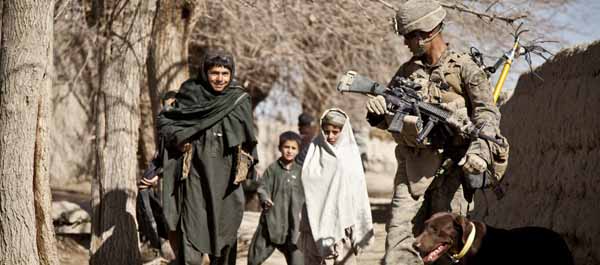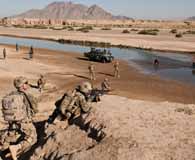The Endless & Unwinnable War

We usually think of milestones in positive terms, but in October there was another landmark date that seems to have passed almost unnoticed across America.
The Afghanistan war that has now entered its twelfth year has long since become the longest war in American history, unless you count the Korean War, which technically has never ended. What began in 2001 as a necessary and ultimately very effective action after 9/11 to remove the Taliban from control of Afghanistan has now turned into an endless and unwinnable war that seems destined to encompass future generations of Americans. How long and to what end remain unanswered questions.
{default}I often wonder if the architects of the present war have given the slightest consideration to history and, in particular, to the tortured past of this mostly uncivilized region of the world that is a nation state in name only.
U.S. troops in Afghanistan are like the cavalry guarding forts in the Old West, while the Indians roam free and attack at a time and place of their choosing.
Although it purports to be a nation, Afghanistan is really a great many tribal regions, whose warlords may or may not have an allegiance to the central government or to one another. Although the official languages of Afghanistan are Persian (Dari) and Pashto, more than forty other languages are spoken by tribes that range from the dominant Pashto (which make up approximately 42-percent of the estimated 30 million Afghan population) to Uzbeks, Turkmens, Tajiks, Balochs, and many others, including what is thought to be as many as 3 million nomads.
Among the Pastuns alone there are an estimated sixty different tribes. If there is a common thread to this vast and harsh land it is that these ethnic groups answer only to themselves. When they do form an allegiance with the central government it is often temporary, problematic and usually self-serving.
Once the center of the famous Silk Road trade, the other common trait that characterizes Afghanistan is conflict and war. Moreover, given the high level of political and social unrest in the United States, it becomes somewhat easier to understand the complex entity that is Afghanistan.
The counterinsurgency doctrine formulated some years ago by Gen. David Petraeus and a team of experts at the Command & General Staff College at Fort Leavenworth, Kansas has become a sacred cow, both within the Army and as U.S. doctrine. Not everyone agrees that it is working.
In recent years a few officers have dissented at the risk of their careers to challenge the status quo. Criticism ranges from the assertion that our counterinsurgency strategy can never work as long as the Afghan population distrusts both the legitimacy of its government and foreign intervention. After more than a decade since intervention there is no viable evidence that this will ever change. The accidental killing of civilians by ISAF forces, drones or Allied aircraft simply makes the task far more difficult.
 The training of an Afghan army to take over the fight against the Taliban after the withdrawal of most U.S. combat troops in 2014 has so far failed. The spate of killings of over 53 NATO troops (half of them American) by Afghan soldiers in 2012 alone has reached staggering proportions. No one in the business of working with or training Afghan troops is considered safe. Most Afghans serve primarily for the income military service provides them. Far too many have either become pawns of the Taliban or have nurtured grievances against NATO that have resulted in deadly consequences.
The training of an Afghan army to take over the fight against the Taliban after the withdrawal of most U.S. combat troops in 2014 has so far failed. The spate of killings of over 53 NATO troops (half of them American) by Afghan soldiers in 2012 alone has reached staggering proportions. No one in the business of working with or training Afghan troops is considered safe. Most Afghans serve primarily for the income military service provides them. Far too many have either become pawns of the Taliban or have nurtured grievances against NATO that have resulted in deadly consequences.
Military historian and war correspondent Sir Max Hastings, who has covered eleven wars, including Vietnam and the Falklands, is among the doubters that we are pursuing a viable strategy. As Hastings has recently noted, Afghans have live in a society dominated by warlords and corruption that famously includes Hamid Karzai and his family, which is unlikely to survive once NATO departs.
“Afghans are pragmatists: they back the people most likely to run the place in the future … Every Afghan knows that NATO is quitting in a couple of years … The country will probably end up being divided between the Taliban and local warlords, or some partnership of the two. In any event, a decade from now Afghanistan will bear no resemblance to the sort of country the West wanted to build when it sent in our soldiers … in 2006 the madness of mission-creep set in. NATO committed thousands of troops to the impossible task of trying to stabilise and civilise the country. In this, of course, we have failed. The name of the game now is to save face; to try to arrange matters so that our soldiers can march out of Afghanistan with dignity, instead of joining an unseemly scramble for the door.” (London Daily Mail, September 18, 2012)
The centuries long domination of Afghanistan by the British ultimately came to an ignominious end, and the Russian invasion in 1980 proved once again that Afghanistan and Afghans cannot be subjugated by an alien power. Moreover, to many Afghans the members of the NATO force are regarded with hostility as an invading force. The roots go deep into Afghan history of invaders dating back hundreds of years. As General Stanley McChrystal wrote in his report shortly before being dismissed by President Obama in June 2010: “An isolating geography and a natural aversion to intervention further works against ISAF.”
In March 2011, Ralph Peters, one of the most knowledgeable and prescient experts in the field of counterinsurgency wrote in the pages of Armchair General a brutally honest assessment. While applauding the effective efforts of the CIA and special ops forces in taking out “some nasty Islamist butchers,” he has called the role of our ground forces “heartbreaking.” They have, he notes, done “everything we ask of them, but we’re asking the wrong things. Prisoners of a counterinsurgency doctrine wildly inappropriate to Afghanistan, our senior leaders are engaged in nation-building where there’s no nation to build – while denying that they’re nation building … No one at the top accepts that we’ve stumbled into a long-running civil war” that consists of “religious fanaticism, tribalism and corruption amid a civil war.”
What Ralph Peters wrote eighteen months ago remains just as valid today as the U.S. and its allies struggle in one of the most alien lands on earth to carry out a mission with not much hope of success.


never should have gone in to A-stan like how we did…way too bloated. Spec Ops w/ air support..take out the leaders/groups that did the 9/11 job and move on…We don’t need to be there any further.
At least this time, they haven’t got a useless old duffer like Elphy Bey leading them.
Only he could have permitted the First Afghan War and let it develop to such a ruinous defeat. It was not easy: he started with a good army, a secure position, some excellent officers, a disorganized enemy, and repeated opportunities to save the situation. But Elphy, with the touch of true genius, swept aside these obstacles with unerring precision, and out of order wrought complete chaos. We shall not, with luck, look upon his like again.
Flashman, p.107, Pan edition, 12th printing, 1979.
“”The centuries long domination of Afghanistan by the British ultimately came to an ignominious end””
That is a strange phrase, especially from as respected and admirable a historian as Carlo D’Este. I am not aware that Britain ever ‘dominated’ Afghanistan – instead it was merely concerned with ensuring that the Russians did not do so. More correctly I suppose that after 1841 and the experience of the First Afghan War the British absorbed the idea that Afghans are terrible soldiers and their country easy to conquer, but also one impossible to police, convert or civilize as those features that make Afghans weak formal soldiers make them most adept at the ‘little wars’.
Also not sure what the ‘ignominious end’ was; the Second Afghan War was, except for Maiwand, a resounding success and the Third and final War of 1919 ended with the Afghan Army in headlong retreat. But of course in both cases with the lesson learnt no attempt was made to stay in Afghanistan for any protracted time.
Passing on – my only positive conclusion is that there is a very good chance that Afghanistan may break apart seperating along the line where the non-Pushtu tribesmen reach some 50% of the population. And if that happens I suspect that all but Pakistan will support this new Northern Alliance, if only to ensure that no Taliban influence seeps across their borders.